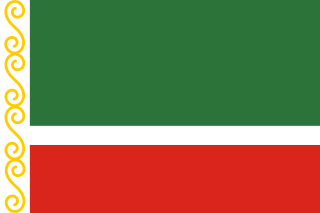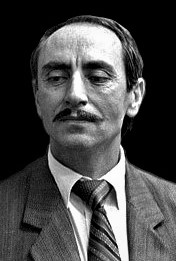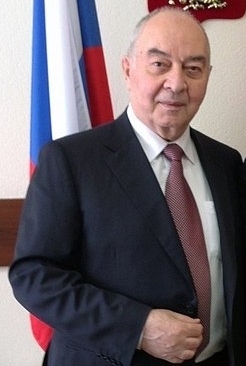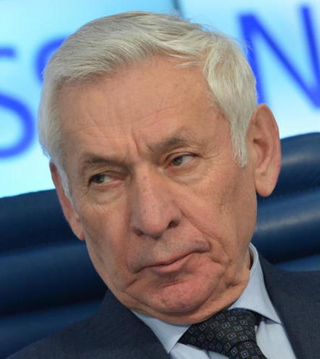
Chechnya, officially the Chechen Republic, is a republic of Russia. It is situated in the North Caucasus of Eastern Europe, between the Caspian Sea and Black Sea. The republic forms a part of the North Caucasian Federal District, and shares land borders with Georgia to its south; with the Russian republics of Dagestan, Ingushetia, and North Ossetia-Alania to its east, north, and west; and with Stavropol Krai to its northwest. After the dissolution of the Soviet Union in 1991, the Checheno-Ingush ASSR split into two parts: the Republic of Ingushetia and the Chechen Republic. The latter proclaimed the Chechen Republic of Ichkeria, which declared independence, while the former sided with Russia. Following the First Chechen War of 1994–1996 with Russia, Chechnya gained de facto independence as the Chechen Republic of Ichkeria, although de jure it remained a part of Russia. Russian federal control was restored in the Second Chechen War of 1999–2009, with Chechen politics being dominated by the former Ichkerian Mufti Akhmad Kadyrov, and later his son Ramzan Kadyrov.

The First Chechen War, also referred to as the First Russo-Chechen War, was a struggle for independence waged by the Chechen Republic of Ichkeria against the Russian Federation from 11 December 1994 to 31 August 1996. This conflict was preceded by the battle of Grozny in November 1994, during which Russia covertly sought to overthrow the new Chechen government. Following the intense Battle of Grozny in 1994–1995, which concluded with a pyrrhic victory for the Russian federal forces, Russia's subsequent efforts to establish control over the remaining lowlands and mountainous regions of Chechnya were met with fierce resistance and frequent surprise raids by Chechen guerrillas. The recapture of Grozny in 1996 played a part in the 1996 Khasavyurt Accord (ceasefire), and the signing of the 1997 Russia–Chechen Peace Treaty.

Akhmat-Khadzhi Abdulkhamidovich Kadyrov was a Russian politician and revolutionary who served as Chief Mufti of the Chechen Republic of Ichkeria in the 1990s during and after the First Chechen War. At the outbreak of the Second Chechen War he switched sides, offering his service to the Russian government, and later became the President of the Chechen Republic from 5 October 2003, having acted as head of administration since July 2000.
The history of Chechnya may refer to the history of the Chechens, of their land Chechnya, or of the land of Ichkeria.

The flag of Chechnya is a rectangle with sides in the ratio 2:3 representing the Chechen Republic, a republic of Russia. The flag is composed of three horizontal bars of, from top to bottom: green, representing Islam; white; and red; superimposed on them is a narrow vertical white band at the hoist, containing the national ornament, a design of four golden scroll shapes.

The republics are one type of federal subject of the Russian Federation. 21 republics are internationally recognized as part of Russia; another is under its de facto control. The original republics were created as nation states for ethnic minorities. The indigenous ethnicity that gives its name to the republic is called the titular nationality. However, due to centuries of Russian migration, a titular nationality may not be a majority of its republic's population. By 2017, the autonomous status of all republics was formally abolished, making the republics politically equivalent to the other federal subjects of Russia.

Dzhokhar Musayevich Dudayev was a Chechen politician, statesman and military leader of the 1990s Chechen Independence movement from Russia. He served as the first president of the Chechen Republic of Ichkeria, from 1991 until his assassination in 1996. Previously he had been a senior officer in the Soviet Air Forces.

The president of Ichkeria, formally the president of the Chechen Republic of Ichkeria was the head of the Chechen Republic of Ichkeria from 1991 to 2007, the Islamic Republic that existed until the victory of the Russian Federation in the Second Chechen War.

When the Soviet Union existed, different governments had ruled the southern Caucasus regions of Chechnya and Ingushetia. Within the Mountain Autonomous Socialist Soviet Republic, later annexed into the Russian Socialist Federative Soviet Republic, they were known as the Chechen Autonomous Oblast and the Ingush Autonomous Oblast, which were unified on January 15, 1934, to form the Checheno-Ingush Autonomous Oblast. It was elevated to an autonomous republic as the Checheno-Ingush Autonomous Soviet Socialist Republic from 1936 to 1944 and again from 1957 to 1993. Its capital was Grozny.

Doku Gapurovich Zavgayev is a Soviet and Russian diplomat and politician from Chechnya. He was the leader of the Checheno-Ingush ASSR.

The Chechen Republic of Ichkeria, known simply as Ichkeria, and also known as Chechnya, was a de facto state that controlled most of the former Checheno-Ingush ASSR from 1991 to 2000.

The Republic of Chechnya is a constituent republic and federal subject of the Russian Federation. It is located in the Caucasus region in southwest Russia. It is the political successor of the Checheno-Ingush Autonomous Soviet Socialist Republic. From a centralized form of government during the existence of the Soviet Union, the republic's political system went upheavals during the 1990s with the establishment of the Chechen Republic of Ichkeria, leading to the First Chechen War and the Second Chechen War which left the republic in total devastation. In 2000, following Russia's renewed rule, a local, republican form of government was established in the republic under the control of the Russian federal government.

The deportation of the Chechens and Ingush, or Ardakhar Genocide, and also known as Operation Lentil, was the Soviet forced transfer of the whole of the Vainakh populations of the North Caucasus to Central Asia on 23 February 1944, during World War II. The expulsion was ordered by NKVD chief Lavrentiy Beria after approval by Soviet leader Joseph Stalin, as a part of a Soviet forced settlement program and population transfer that affected several million members of ethnic minorities in the Soviet Union between the 1930s and the 1950s.

The Russian Soviet Federative Socialist Republic, previously known as the Russian Soviet Republic and the Russian Socialist Federative Soviet Republic, and unofficially as Soviet Russia, was an independent federal socialist state from 1917 to 1922, and afterwards the largest and most populous constituent republic of the Soviet Union (USSR) from 1922 to 1991, until becoming a sovereign part of the Soviet Union with priority of Russian laws over Union-level legislation in 1990 and 1991, the last two years of the existence of the USSR. The Russian SFSR was composed of sixteen smaller constituent units of autonomous republics, five autonomous oblasts, ten autonomous okrugs, six krais and forty oblasts. Russians formed the largest ethnic group. The capital of the Russian SFSR and the USSR as a whole was Moscow and the other major urban centers included Leningrad, Stalingrad, Novosibirsk, Sverdlovsk, Gorky and Kuybyshev. It was the first socialist state in the world.

The Parliament of the Chechen Republic is the regional parliament of Chechnya, a federal subject of Russia. A total of 41 deputies are elected for five-year terms.

The Chechen–Russian conflict was the centuries-long ethnic and political conflict, often armed, between the Russian, Soviet and Imperial Russian governments and various Chechen forces. The recent phase of the conflict started after the dissolution of the Soviet Union in 1991 and ended with the oppression of Chechen separatist leaders and crushing of the separatist movement in the republic proper in 2017.

Salambek Naibovich Khadzhiyev was a Soviet-Russian Chechen petrochemist, businessman and politician who was the first Chairman of the Government of National Revival of the Chechen Republic. He specialized in the production of low-pour, high-density petroleum fuels transformations of hydrocarbons on zeolite that contain catalysts. He was also the first and only Chechen to hold a ministerial position in the Soviet Union. In 1991, he headed the Ministry of Chemical and Petrochemical Industry of the USSR. During the First Chechen War in 1995 he was the chairman of the Government of the National Revival of Chechnya.
The Decree of Sovereignty of the Chechen Republic was a formal declaration of independence for the autonomous Soviet Republic of Checheno-Ingush ASSR. Between 1991 and 2000 Chechnya was de facto an independent state. The declaration was issued on 1 November 1991, by the head of the All-National Congress of the Chechen People, Dzokhar Dudayev.
The Chechen Revolution was a series of anti-government protests in the Checheno-Ingush Autonomous Soviet Socialist Republic of Russian Soviet Federative Socialist Republic against the local Communist Party officials.
General elections were held in the Chechen Republic on 27 October 1991 to elect the president and parliament. The presidential election resulted in a victory for Dzokhar Dudayev.















